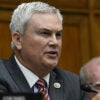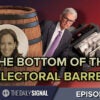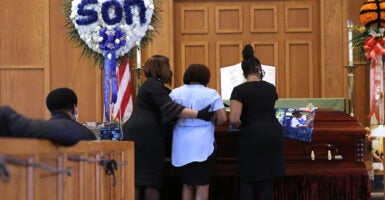Lorrain Taylor lost her twin sons to gun violence in Oakland, California, in 2000. They were just 22 years old and working their way through college when they were killed.
“We are here to say, ‘No, no more senseless violence,’” Taylor said at the launch Friday of Voices of Black Mothers United, an initiative of the Woodson Center, a Washington, D.C.-based nonprofit.
Voices of Black Mothers United is aimed at giving a platform to grieving mothers who, like Taylor, have lost children—or other family members—to violence in their own communities.
Led by mothers of slain children, the program seeks to “bring together law enforcement and community partners to support solutions to senseless violence with community-based intervention and sensible police reform, while pushing back against the ‘Defund the Police’ movement,” according to a Woodson Center press release announcing the initiative.
Through local chapters, the mothers will engage in activities to bring healing to families who have suffered loss and to prevent further violence in their communities. The first aim is to “provide grief counseling and support for moms who lost children,” Robert Woodson, founder and president of the Woodson Center, said during the program’s online launch.
The chapters will also support “local interventions that have proven effective to reduce violence” and will stand committed to “promoting positive policing,” Woodson said.
The mission of the Woodson Center, which was founded in 1981, is to inspire racial unity and strengthen communities through improving public safety and creating opportunities for upward mobility.
As America continues to struggle with racial reconciliation, the Woodson Center has taken it upon itself to develop and propose solutions to the challenges African Americans face and to push back on the left-wing Defund the Police movement.
Those calling for defunding the police are not those who live in the neighborhoods most in need of law enforcement, Woodson said, who explained why the Defund the Police movement is not reflective of the desires of much of the black community in a recent press release.
Despite the fact that over 80% of black people want police to spend the same amount of or more time in their community, a radical fringe of people who will not have to deal with the consequences are trying to ‘defund the Police’—and claim that this is what the people in dangerous neighborhoods want.
That simply is not true. We’ve heard enough from them. Now is the time to listen to the actual neighborhoods, and the people suffering as violent crime spikes.
For too long, mothers who have lost a child to violence within their own communities have not been given a voice, said Sylvia Bennett-Stone, the executive director of the Voices of Black Mothers United.
Through Voices of Black Mothers United, we can begin a discussion about what is happening in our neighborhoods and develop solutions to end the violence, she added.
Bennett-Stone lost her daughter and her daughter’s best friend to violence in 2004. “We, as mothers, have often been told that ‘you need to just go be quiet, you need to get over it.’ But there is no getting over putting your child in the ground due to the decision of someone else taking their lives,” she said.
“We have over 25,000 mothers throughout the states,” she said of the initiative. “And we are taking a stand as one voice.”
Voices of Black Mothers United is focused on solutions and does “not support defunding the police, because we feel as though we need the police in our communities,” Bennett-Stone said. “And yet, we want police accountable for their actions.”
Carolyn Johnson Turner, the Alabama state leader for Voices of Black Mothers United and the founder of Parents Against Violence, started working closely with the Birmingham Police Department after her son was fatally shot in 2003 at the age 20 as he parked his car at a birthday party.
After her son’s killing, Turner kept calling the police to ask whether they had found the man who shot her son. The police “would tell me that they were trying to find out who killed him … but they did not have the manpower to keep working on his case. That’s when I discovered that they did not have a cold case unit … .”
Turner challenged the Birmingham Police Department to open a cold case unit to work on her son’s killing and cases like it, and was successful in getting the department to do so. She then began working with community leaders and the police department to stand against violence in the community, and says that she thinks many lives have been saved as a result.
Since founding Parents Against Violence in 2004, Turner has spoken with many grieving mothers who have lost children to senseless violence. But far too often, those mothers do not feel supported and do not feel that they have a way to share their stories, Turner said.
“We see so many times on television that when a black person is killed by a white person or a police officer, there is so much support,” Turner said. “But when it’s us [other blacks], … they are telling us to ‘be quiet, get over it,’ to ‘just deal with it.’ But it’s hard. It hurts.”
Through the leadership and experience of Bennett-Stone, Turner, Woodson, and others, Voices of Black Mothers United is creating a space for mothers to share their pain and grief and to develop solutions with local police and community partners that will save lives.
The program already has eight chapters across the country—in New York, Alabama, Indiana, Pennsylvania, the D.C.-Maryland-Virginia area, South Carolina, North Carolina, and Georgia.
The Woodson Center is working to establish more chapters across the nation and ensure that every chapter has the resources they need to develop an outreach structure within local communities.
“Right now, millions of dollars are being given to so-called social advocate groups to address systemic racism,” Woodson said. But what the Woodson Center initiative is seeking to do is “persuade private donors, foundations, and the government to invest in communities where the solutions are.”
The work of Voices of Black Mothers United stands to be highly impactful because of the initiative’s community-based focus, Woodson said, adding that the solutions needed to end senseless violence “come from the same ZIP code as the problem.”
Have an opinion about this article? To sound off, please email letters@DailySignal.com and we will consider publishing your remarks in our regular “We Hear You” feature.




























